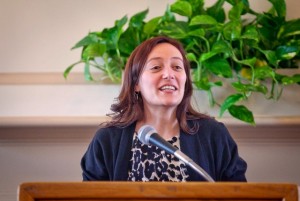Professor Jennifer Talarico disproves misconceptions about “flashbulb” recollections
Where were you on Sept. 11, 2001? Chances are your memories are extremely detailed. But are they accurate? That is the kind of question Jennifer Talarico poses in her research.

Professor Jennifer Talarico
Talarico, associate professor of psychology, studies how people naturally remember life events, what triggers those memories later, how the experience itself influences how it is remembered, and how remembering the past shapes current emotions, behavior, and cognition.
Whereas traditional memory research might present people with a list of 10 words to see how many they can accurately recall an hour later, Talarico asks people to remember a specific event from their lives to see what they recall and how vividly they can bring it to mind. “Flashbulb” memories are those from a significant, emotional event, such as the Sept. 11 terrorist attacks. What is interesting, she says, is that although most people believe their recollections are very accurate, “flashbulb” memories are not remembered more precisely than everyday memories.
Talarico’s current research is focused on common events that are comparable to flashbulb events. She demonstrated how emotional reactions can influence memory, for example, by studying how both Lafayette and Lehigh fans remembered the rivalry football game.
This fall, Katie Elander ’15 (Basking Ridge, N.J.), a double major in psychology and art and a member of the women’s lacrosse squad, will work with Talarico on flashbulb-type events through independent study. Talarico often mentors students in independent study and honors thesis research.
“The best way to understand science is to actually do science,” says Talarico. “Students come to understand the real complexities of research design and data analysis when confronted with real decisions.”
The research assistants have a crucial role to play in her work. To avoid biased results, both the experimenter and the participant need to be blind to the research hypothesis, making it nearly impossible for her to work alone. They also assist in the practical aspects of her research design, like finding campus events that many students find engaging and determining incentives for study participants.
“Most people are inherently interested in other people and so they have a naïve understanding of psychology,” says Talarico. “The fun part is showing them which of their beliefs are actually supported by the science and which are not.”
